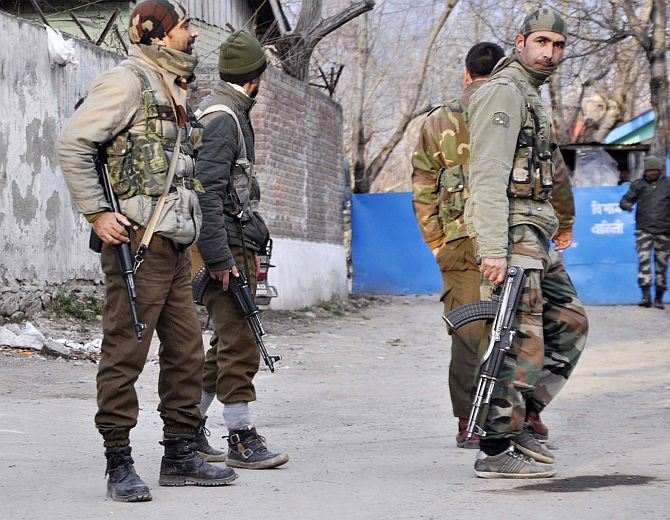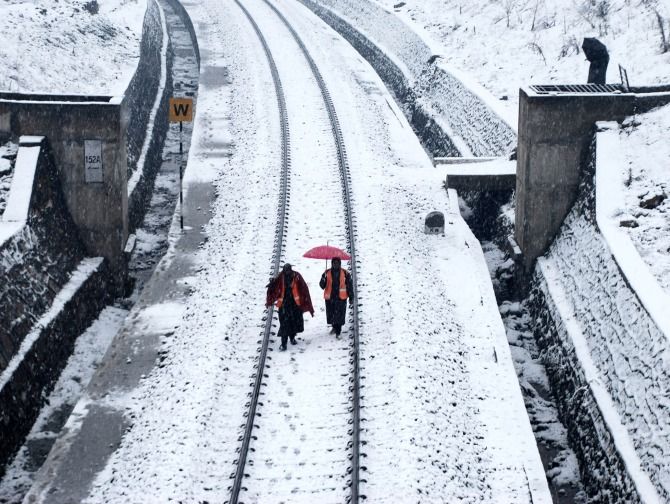'It would be very easy for me to say, it's only the Pakistanis that want the Kashmir issue to remain alive.'
'Trust me, there is a vested interest on the Indian side in keeping the issue of Jammu and Kashmir alive.'
Omar Abdullah speaks at the Georgetown University in Washington, DC. Aziz Haniffa/Rediff.com listens in.
 Omar Abdullah, speaking at a US university for the first time in his life -- and that too at the prestigious Georgetown University -- slammed the Narendra Modi government for not alleviating the suffering of victims of the recent floods in the Kashmir valley.
Omar Abdullah, speaking at a US university for the first time in his life -- and that too at the prestigious Georgetown University -- slammed the Narendra Modi government for not alleviating the suffering of victims of the recent floods in the Kashmir valley.
Speaking at the historic Gaston Hall to a packed audience -- the majority of whom were students at the University's School of Foreign Service Asian Studies Programme -- Abdullah said, "We were really looking toward the Government of India to help financially with people rebuilding their lives and that hasn't happened."
"We are talking about a prime minister who very flamboyantly promised to underwrite the Pakistani damage when these floods broke out, because they had a degree of flooding there, and so, when he came to Srinagar, he said not only will we rebuild this side, but I am happy to help the other side as well and India will contribute to Pakistan's rebuilding."
"I wish he would contribute to just ours and forget about Pakistan's," the former chief minister of Jammu and Kashmir, said, adding, "because out of the Rs 44,000 crores (Rs 440 billion) that we asked for, we haven't got even Rs 4,000 crores (Rs 40 billion) as yet."
"So, that's the ratio in terms of how much money is required for rebuilding, and how much actually has come in."
Abdullah, who was defeated in last year's assembly election -- his National Conference party of which he was at the helm for six years got an unprecedented drubbing -- asserted that the Bharatiya Janata Party does not care for its base in Jammu and predicted, "A couple of forthcoming elections are going to indicate just how much room to maneuver Prime Minister Modi has."
"I don't think, beyond a point, the BJP is particularly worried about its base in Jammu, because at the end of the day, it only contributes two seats in Parliament."
Hence, with regard to how much traction the People's Democratic Party -- which currently rules J&K with the BJP as its ally -- would get on issues like the Armed Forces Special Protection Act, the reduction of the security forces' footprint in the state, a dialogue with the separatists and issues that the PDP has tried to make its own, Abdullah felt, "will be largely determined by what happens in these couple of state elections."
"And, if as popular wisdom would suggest the graph of the BJP is not as healthy as they would like it to be, it doesn't bode well for taking any of these agenda items forward."
"If the BJP loses Bihar," Abdullah predicted, "whatever forward movement they would like to make on issues in Jammu and Kashmir will grind to a halt."
Abdullah also said vested interests in India were to blame for the imbroglio in Jammu and Kashmir continuing to fester and reiterated that all of the blame for this problem remaining unresolved cannot be placed wholly on Pakistan.
"Every time a dialogue starts," Abdullah said, "something happens to derail it, and therefore, one of the challenges is going to be how do you keep a sustained dialogue going in spite of the fact that there would be people around who want to derail that dialogue process."
"Please understand," he argued, "there is a huge vested interest built up on both sides of the Line of Control in keeping the problem in Jammu and Kashmir alive."
"It would be very easy for me to stand up here," Abdullah asserted, "and say, it's only the Pakistanis that want the Kashmir issue to remain alive."
"But honestly, trust me, there is a vested interest -- how much, we can argue the numbers -- but let's not kid ourselves, that there is no vested interest on the Indian side in keeping the issue of Jammu and Kashmir alive."
"Surprisingly enough, if you look at the two recent elections -- national elections in Pakistan and India -- the tone and tenor of the campaigns, Jammu and Kashmir was more of an issue in the Indian election then it was in the Pakistan election."
"In fact, I don't recall any of the major political parties, whether it was Nawaz Sharif's, Zardari's or Imran Khan's, actually making an issue out of Jammu and Kashmir in their general election. You only have to look back at our own election -- seven to eight months ago -- and you would have seen how much that Jammu and Kashmir was part of the narrative in that election."
"So, it's not just the Pakistanis that use Jammu and Kashmir for political purposes."
Abdullah called for the Line of Control to be recognised as the border if the Jammu and Kashmir problem is to be resolved, and argued that the current status quo is untenable.
"It will be difficult to sell, either in India or Pakistan," Abdullah acknowledged, "but I can't to the best of my imagination, come up with a more viable solution that over time will begin to work."
"Please understand," he explained, "We ourselves have recognised this Line of Control, when we had every reason not to. Please go back to recently as 1999, the Kargil War. If India wanted to, they could have crossed the Line of Control. They could have started to retake territories that are occupied by Pakistan."
"We didn't even let our fighter planes cross the Line of Control to shell the positions held by Pakistan. We lost soldiers, we lost pilots because it was carved in stone for them -- that you will not cross the Line of Control under any circumstances."
"So, in a period of conflict, if we recognised the Line of Control as the line that was not to be crossed, I think we kind of sent out a message that this is something that can form part of an overall solution."

Abdullah strongly defended his opposition to the separate encampments in townships for returning Kashmiri Pandits and warned that it would result in the "ghettoisation" of the Pandits in the Kashmir valley.
"I do not believe that they will come back in the numbers that left. Twenty-five years is a very long time for people to establish roots elsewhere. But they want to know and they need to know that they can come back."
"I believe if you really want to bring Jammu and Kashmir back to what it was pre-militancy, you can't have individuals and islands of populations. That this township is a Hindu township, this township is a Sikh township, this township is a Muslim township."
He strongly argued against mediation by the United States or any other part of the international community to pressure India and Pakistan to reach a rapprochement on Jammu and Kashmir.
"For the international community, I just hope they recognise that Jammu and Kashmir is not an issue where mediation is going to work," he said, and recalled, "Every time an international power has felt, we can mediate this dispute or this problem, the doors have been slammed so fast it will take your breath away."
"A certain amount of back-channel facilitation always helps," he felt, "but nothing more than that -- just simply the role of an honest broker."
"This is a problem that India and Pakistan have to resolve amongst themselves," he added, and pointed out, "There is a huge degree of suspicion of any country expressing a great degree of interest than they should."
Abdullah exhorted Washington to use its leverage to pressure Pakistan "just to fulfill obligations and commitments they have made with regard to not using their territory to support any sort of militancy or incursions, and at the same time, convince the Government of India to remain engaged with Islamabad, regardless of the attempts to derail the dialogue process."
Abdullah told Rediff.com that he was in the US solely to keynote the Kashmir Conclave hosted by the Georgetown-India Dialogue.
Besides a few days in Washington, DC, he said, he would travel to New York to meet friends and family and denied that he had met any Obama administration officials or US lawmakers on Capitol Hill.
"That is all way above my pay grade," he quipped, "I don't want to complicate anything."
Images: Top: Troops of the Indian Army's Special Operations Group and the Jammu and Kashmir Police at the encounter site in Tral, south Kashmir. Photograph: Umar Ganie
Bottom: The snow covered Srinagar Banihal railway track. Photograph: Umar Ganie










